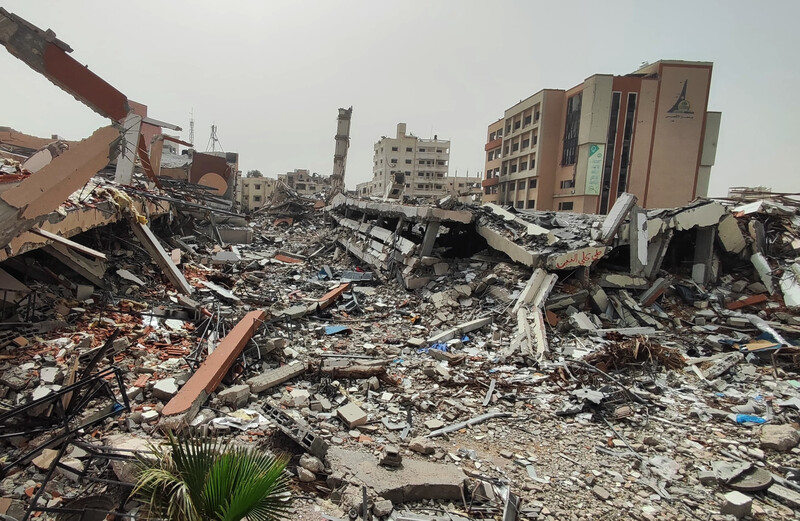The Electronic Intifada 22 April 2024

Israel has carpet-bombed parts of Gaza City.
APA imagesHala al-Aswad has two daughters with disabilities.
One of her daughters Fedaa was diagnosed with lymphatic filariasis (commonly known as elephantiasis) when she was just 8 months old. Fedaa is now 23.
Another daughter Nedaa was born with cirrhosis. She is now aged 21.
Before the current Israeli war on Gaza, Hala did everything she could so that her daughters could be happy.
Although the family are poor, they managed – with the help of donations – to furnish the sisters’ room so that it would be as comfortable as possible. Hala made sure they got the best treatment she could find and brought them on regular day trips.
Then the genocide began.
On 8 October – one day after Benjamin Netanyahu declared a major war against Gaza – Israel bombarded the area near where the family lived in al-Karama, a Gaza City neighborhood. Hala and her son Asad struggled to find a car so that they could evacuate Fedaa and Nedaa.
“I had to leave everything I had worked hard for behind,” Hala said. That included her daughters’ wheelchairs and their medical reports.
Soon after they left their home, it was subjected to an Israeli airstrike.
Hala and her daughters took shelter at a school in Gaza City’s Beach refugee camp. They stayed there for about three weeks.
When Israel carpet-bombed the area, the family tried to escape. That meant Hala had to carry Nedaa, while Asad carried Fedaa.
In the panic of escaping, the family became separated.
Hala reached al-Shifa, Gaza’s largest hospital, with Nedaa in her arms. When she arrived, she could not see Asad or Fedaa anywhere.
Hala feared they had been killed along the way.
It came as a major relief to hear Asad’s voice. He and Fedaa had actually arrived earlier at the hospital.
“I hugged Asad tightly,” Hala said. “And I shed tears of joy.”
Conditions worsen
They spent just one night in the hospital as it was so crowded with people who had been displaced. The next morning, they moved to a school in al-Nasr, another part of Gaza City, where they spent the following two weeks.
During November, the school and other nearby buildings were surrounded by Israeli troops in tanks.
When soldiers invaded, they searched the school for a few hours and interrogated the family before letting them go.
Hala had to walk with her daughters among dead bodies left on the streets. Fedaa screamed repeatedly.
They made it to a warehouse in al-Daraj, a Gaza City neighborhood, where they took shelter.
Around midnight, a building close to the warehouse was struck with a missile. Nedaa was hit in the face with shrapnel and fell to the ground.
As Nedaa was motionless, Hala assumed she had been killed. Yet Nedaa soon began making a painful sound.
She was bleeding profusely.
The family lifted up Nedaa and rushed to al-Ahli hospital in Gaza City for treatment. Staff in that hospital had kept providing services even though it was the location of a huge explosion, which killed hundreds of people, during October.
Now the family are staying in another small warehouse. It is situated in the northern part of Gaza.
Lacking proper food and living in unsanitary conditions, the health of both Nedaa and Fedaa has deteriorated. According to their mother, they both require surgery.
Although they have suffered immensely, their mother is determined to maintain a positive attitude. She is hoping that the two young women will be able to receive the treatment they need outside Gaza as soon as possible.
Dana Besaiso is a writer and translator in Gaza.



